Standing Up, Speaking Up in the Gospel of Mary—Deborah Saxon & Mark M. Mattison

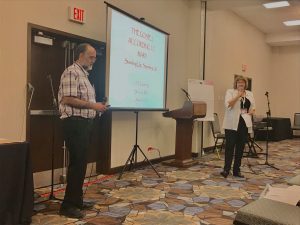
(photo by Dr. Christy Sim)
At the Christian Feminism Today Gathering Dr. Deborah Saxon and Mark M. Mattison gave a fascinating plenary presentation titled “Standing Up, Speaking Up in the Gospel of Mary.” These two biblical scholars illuminated a text used by followers of Jesus as early as the second century. This long-ignored text portrays the courageous leadership of Mary Magdalene in the early Jesus movement. Deborah and Mark used this long-ignored Gospel of Mary to help us think together about the challenges and opportunities for us today as we stand up and speak up for what we believe.
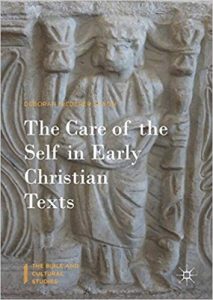 In conversations with Deborah at the 2016 Christian Feminism Gathering, I learned of her research and writing, some of which is published in her book The Care of the Self in Early Christian Texts. A little more than seven years ago, I learned about Mark’s work on the Divine Feminine Version of the New Testament and featured him on my blog and later in She Lives! Sophia Wisdom Works in the World. I have been impressed by the depth of Deborah and Mark’s biblical knowledge and scholarship.
In conversations with Deborah at the 2016 Christian Feminism Gathering, I learned of her research and writing, some of which is published in her book The Care of the Self in Early Christian Texts. A little more than seven years ago, I learned about Mark’s work on the Divine Feminine Version of the New Testament and featured him on my blog and later in She Lives! Sophia Wisdom Works in the World. I have been impressed by the depth of Deborah and Mark’s biblical knowledge and scholarship.
In their presentation at this summer’s Gathering, Deborah and Mark began by displaying art from the early Christian centuries. Some of these artworks show Mary, the mother of Jesus, and other women in positions of authority and leadership in the early church. Although women are often denied leadership in churches today, ancient art and texts reveal women as leaders in the early Jesus movement.
Moving on to the Gospel of Mary, Deborah and Mark pointed out that this Gospel is about Mary Magdalene, but not written by her. The Gospel of Mary was discovered a little over a century ago in Egypt, but more than half of it is missing. It was originally written in Greek early in the second century and later translated into Coptic.
Deborah explained a portion of the Gospel of Mary that gives a perspective on the interconnection of all things in nature. “Every nature, every form, every creature exists in and with each other, but they’ll dissolve again into their own roots, because the nature of matter dissolves into its nature alone.”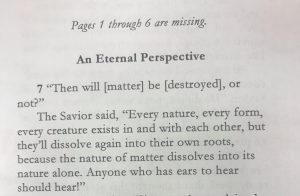
In the canonical Gospels Mary Magdalene plays a prominent role as a follower of Jesus (Luke 8:1-3) and the first witness of the resurrection (John 20:1-18), “the apostle to the apostles.” The long-overlooked Gospel of Mary adds to the story of her as a leader of the early followers of Jesus.
Mark compared the part Mary Magdalene played as a teacher of the other disciples to the role of the Holy Spirit, whom Jesus mentions as teaching “all things” and reminding them of everything that Jesus had told them. These verses from the Gospel of Mary and the Gospel of John illustrate this comparison: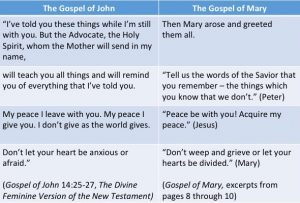
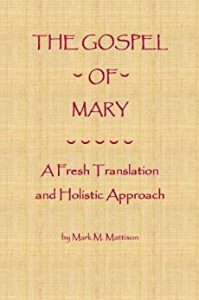 Deborah and Mark pointed out passages in the Gospel of Mary that record the disciples’ questioning Mary’s authority as a teacher and leader (translations by Mark):
Deborah and Mark pointed out passages in the Gospel of Mary that record the disciples’ questioning Mary’s authority as a teacher and leader (translations by Mark):
In response Andrew said to the brothers and sisters, “Say what you will about what she’s said, I myself don’t believe that the Savior said these things, because these teachings seem like different ideas.” In response Peter spoke out with the same concerns. He asked them concerning the Savior: “He didn’t speak with a woman without our knowledge and not publicly with us, did he? Will we turn around and all listen to her? Did her prefer her to us?”
Although Andrew and Peter didn’t believe Mary, the only woman in the group of disciples, she had the courage to stand up and speak up for what she knew to be true:
Then Mary wept and said to Peter, “My brother Peter, what are you thinking? Do you really think that I thought this up by myself in my heart, or that I’m lying about the Savior?”
Then Levi spoke up in Mary’s defense:
In response Levi said to Peter, “Peter, you’ve always been angry. Now I see you debating with this woman like the adversaries. But if the Savior made her worthy, who are you then to reject her? Surely the Savior knows her very well. That’s why he loved her more than us.”
The Gospel of Mary doesn’t record the male disciples questioning Levi’s words, just as today men are often believed more than women, Deborah and Mark observed. Male advocates, like Levi, are then important.
You may want to explore these questions that Deborah and Mark posed to participants at the Gathering:
1. Have you ever heard of the Gospel of Mary before tonight? What parts of it do you find most interesting, compelling, or relevant to your own life and social context
2. What are the challenges Mary faces in speaking out in her Gospel? What challenges do you face in your own life? What form do they take?
3. What sustains you or helps you in speaking out? What inspiring contemporary examples can you share that parallel Mary’s courage?
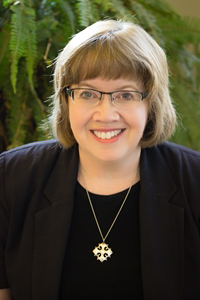
Deborah Saxon, Ph.D., teaches at Butler University in Indianapolis, Indiana. She is the author of The Care of the Self in Early Christian Texts. Deb researches newly discovered Christian texts, women’s voices, the inclusive perspectives they reveal, and the intersection of gender and religion.

Mark M. Mattison is an independent writer and scholar. He is the author of The Gospel of Judas: The Sarcastic Gospel; The Gospel of Thomas: A New Translation for Spiritual Seekers; The Gospel of Mary: A Fresh Translation and Holistic Approach; and The Goblin Gambit. He was one of the creators of the Divine Feminine Version of the New Testament.
So good!! I would have looooooved to have heard that lecture. Thanks for taking us all with you and spreading this deleted canon!
Yes, you would have loved this lecture! Deb and Mark have impressive knowledge and wisdom about this deleted canon and other ancient, overlooked sacred texts.